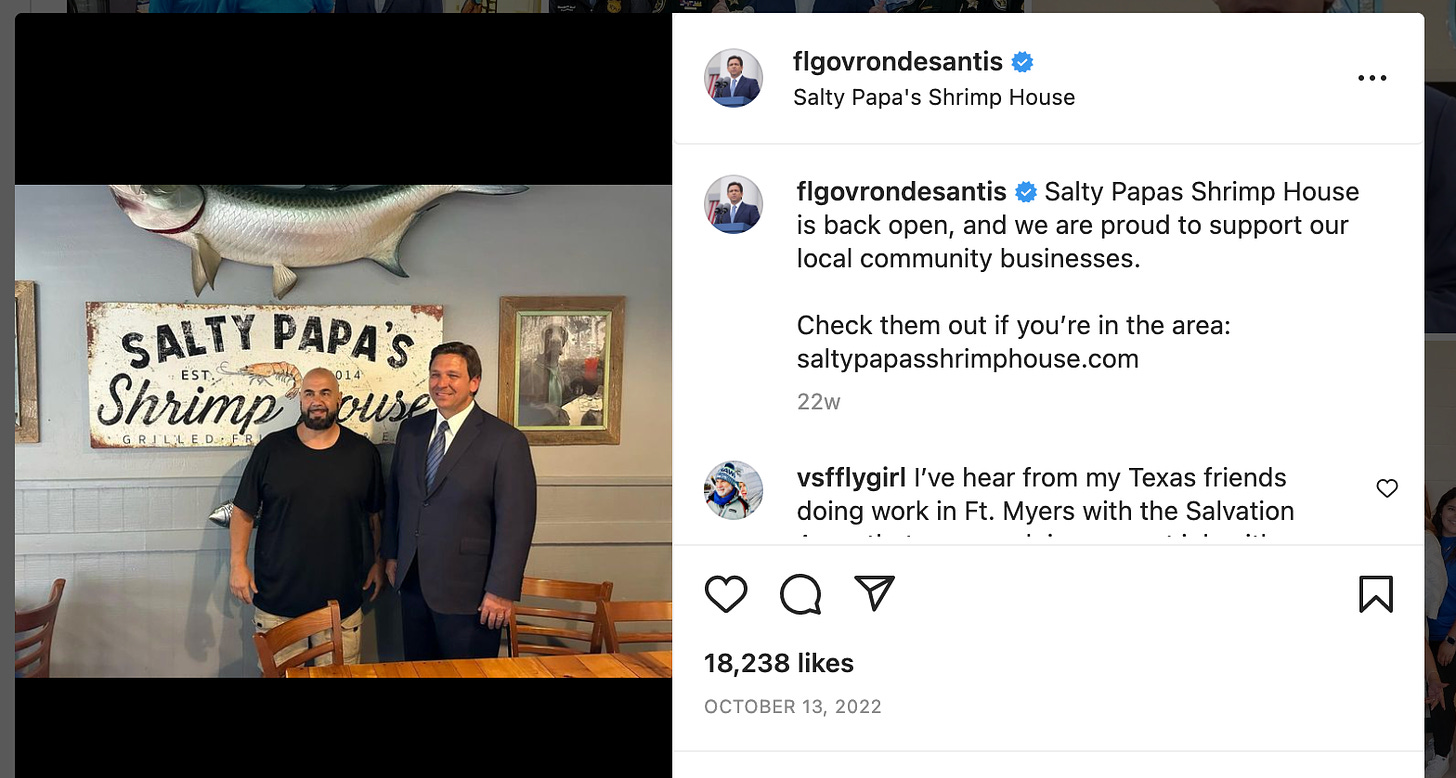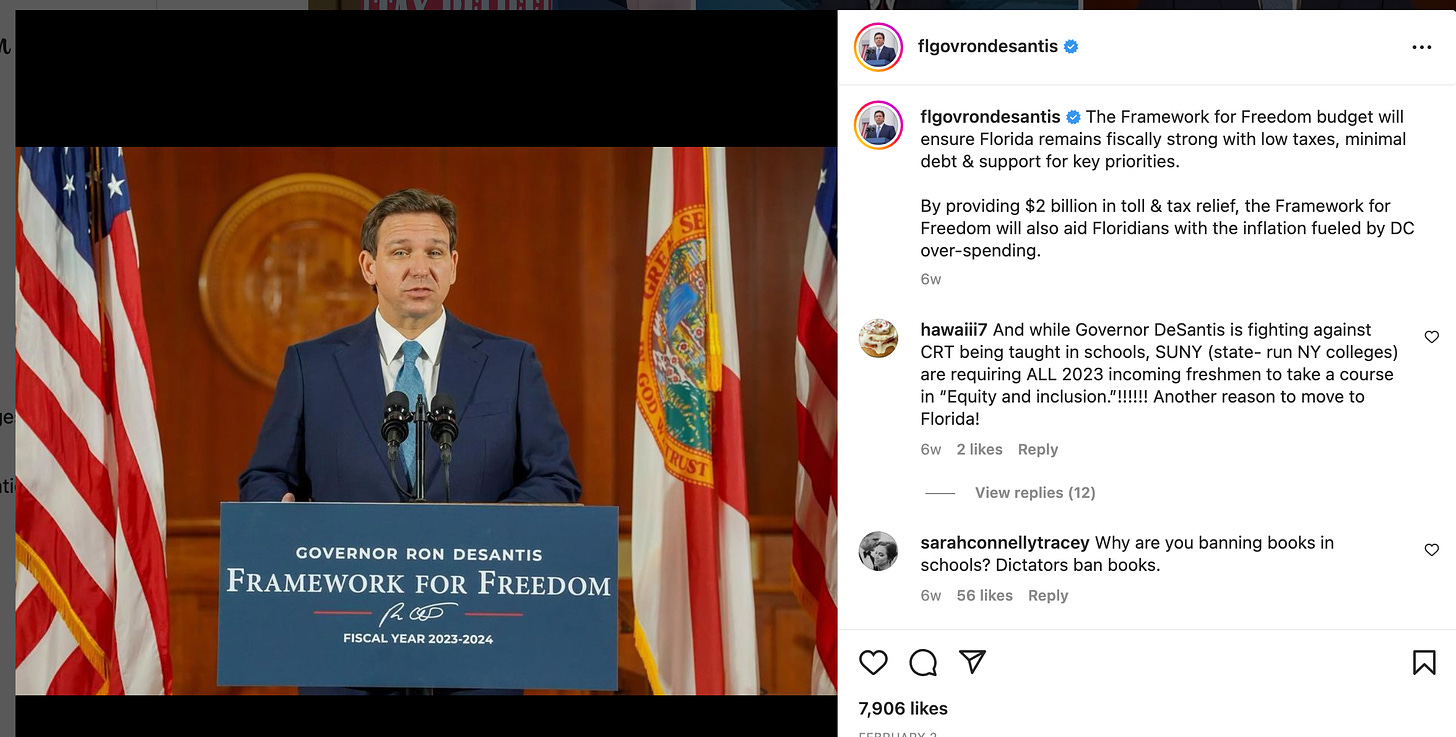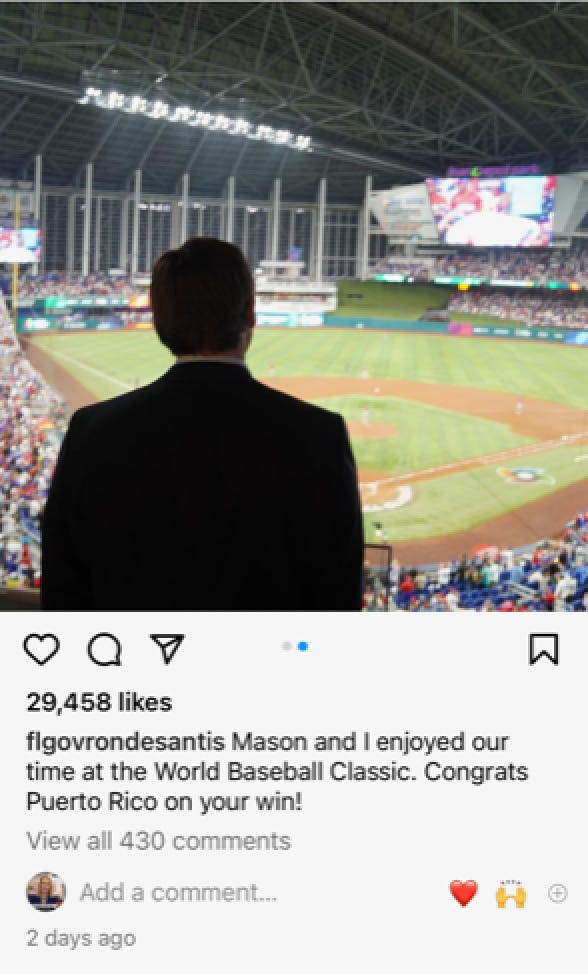Ron DeSantis, Devoid of Charisma, Builds a Leader Cult on Instagram
Do you need charisma to succeed as an authoritarian? Not always
"He has the charisma of a cinder block," one Twitter user wrote of Florida Governor Ron DeSantis, who is laboring to construct a personality cult as he waits in the wings for former President Donald Trump, his rival for the GOP nomination, to implode. "Is it just me, or does DeSantis have all the charisma of pawpaw fruit?" remarked former prosecutor Glenn Kirschner, posting a picture of a wrinkled fruit next to the face of the often-scowling governor.
Do you need charisma to succeed as an authoritarian? Not always. General Francisco Franco had little before he became head of state in 1939; General Augusto Pinochet, who became dictator after the U.S.-backed 1973 military coup in Chile, had even less. "He was a man in the second row, a man you did not notice," a retired Chilean general told the American journalist Mary Helen Spooner. As for Russian President Vladimir Putin, the former intelligence officer blended into a crowd by design. “Everyone could invest this gray, ordinary man with what they wanted to see in him,” as Masha Gessen notes.
The strongman's secret is that he works hard to develop that ineffable charismatic glow. In the 1920s, when he was trying and failing to get to power, Adolf Hitler hired Heinrich Hoffman to photograph him rehearsing hand gestures as he figured out how to stand out as a speaker. Voice lessons he took with the actor Emil Jannings also paid off.
Even Trump's easy performances, which have been key to the bonds he forges with followers, are the product of decades of practice. New York Times photographer Doug Mills, whose photo sessions with three decades' worth of U.S. presidents usually lasted just a few minutes, found that his sessions with Trump took "up to 90 minutes" because Trump was so "camera-conscious" and attentive to every detail of his image.
The history of authoritarian personality cults is useful for understanding the evolution of the DeSantis leader image as it is presented on Instagram. As he positions himself as a presidential contender, the governor trails in polls against Trump, even in Florida. It doesn’t help that he is wooden in public. This is a function of his coldness, his autocratic character, and the insecurity that his bullying is meant to cover up. Yet he's gaining confidence in front of the camera as he's grown from a sycophant under Trump's thumb (he ran for governor in 2018 as a "pitbull Trump defender") to his own (strong)man who is a thorn in Trump's side.
Since the days of Benito Mussolini, authoritarian personality cult canons dictate that the leader must be received as a man of the people as well as a man above all other men. Followers of the DeSantis governor persona on Instagram cannot have missed the photos of the governor posing with the people, standing next to employees of Florida bakeries, restaurants, and small businesses.
Those egalitarian images, which depict DeSantis as visually on the same level as his constituents, now share space with photographs of DeSantis in presidential setups (flags, seals) and often above the human fray. These leader photos have increased as he has exerted more executive overreach over the Florida legislature and state agencies, emerging as a mini-autocrat who requires loyalty at all times, in the Trump manner. The continuous use of children as props is part of this elevation of his authority. Any adult who could be a rival is off-screen. He alone occupies center stage.
These "presidential" images are notable because they stand out from his more typical leadership stylings, which are also used by many other politicians and by military commanders, in which he's flanked by emergency, disaster relief, or law enforcement personnel.
Unsurprisingly, given DeSantis’s seeming desire to turn Florida into a replica of Viktor Orbán's illiberal Hungary, we also see some experimentations with authoritarian aesthetics, such as when he is photographed from the back, dominating space as he gazes upon crowds or sports arenas.
DeSantis's new persona owes much to Trump's, starting with his hand gestures (although he still doesn't always know what to do with his hands, as in this "presidential" compilation video posted on his Instagram a week ago). That imitation is appropriate, given that DeSantis and Trump are two expressions of the same extremist agenda to wreck democracy, protect White Christians, persecute LGBTQ communities, and suppress the rights and erase the histories of non-whites.
Yet DeSantis would convert America to autocracy in his own manner: less noisy insurrection, more weaponization of the law. If the Murdoch family now lionizes him, and dozens of billionaires have donated to him, it's because he is seen as being able to get the job done with less emotion and less drama.
As Jason Stanley argued in December 2021, American fascism was entering its "legal phase," with extremist agendas and ideological fanaticism enshrined in law. DeSantis, who is a lawyer by training, knows that what far-right elites behind him crave now is less a showboating figure, all bluster and charisma, than a cold and calculating bureaucrat. That DeSantis can easily deliver.








My Twitter feed is jam packed with pundits who are writing, or have written, DeSantis off.
I'm happy that at least some serious people are not so easily fooled.
Yes I've noticed the Instagram infiltration for about a year now. I think his PR team works directly with meme guys on IG to get them to give him exposure and make him look like a tough guy. I started doing some digging and realized that DeSantis trolls are ALL OVER Instagram and they are busy gaining young people as his followers. This is a definite strategy to go after young inexperienced people who may think he's cool b/c he tries to humiliate Disney and does "tough guy stuff". You can see below his posts or posts about him just a flurry of robotic comments about how awesome he is, DeSantis is the best, DeSantis 2024 and they're typically what appear to be young people. I've been very happy to see growing counter-offensive of pages dedicated to laying out the truth on him showing up in Reels so anyone can see them.